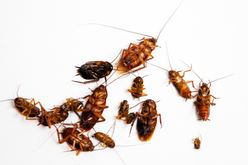Who is responsible for the tenant? Can I use pest control company? This is because your landlord has a duty to ensure that your home is fit to be lived in on the day they let it to you. Landlords , as well as RSLs (Housing Associations and Registered social landlords ) are responsible for pest proofing. They are also obliged to sign a contract for regular pest treatments, if their property is located in an area with a high population of seasonal returning pests.

Find out who’s responsible for dealing with rats, mice, bedbugs, fleas and other infestations in your rented home. When is a landlord responsible for pest control ? There are many ways pests and vermin can enter a property. Ultimately a landlord is responsible for making sure a property is well-maintained and habitable. When it comes to rented accommodation, many people will ask if it’s really their responsibility to arrange and pay for pest control— particularly when they’re a recent tenant and there’s a strong possibility that the pest problem existed before they moved in. In this situation, should your landlord be the one to cover the cost?
If a landlord specifies that a tenant is solely responsible for pest control in a tenancy agreement, and a tenant agrees to those terms, pest control when renting is the contractual responsibility of the tenant. Landlords are responsible for pest control and keeping infestations away but there are situations where a tenant can have living behaviors that lead to an infestation and in those cases a tenant can be responsible for taking care of pest control. When it comes down to deciding who is responsible dealing with a pest problem, there is often disagreement between the landlord or agent and the tenant. Research earlier this year discovered that a quarter of students have vermin in their private student accommodation – from slugs to mice.
You should request them to hire a pest control service and deal with the problem. However, as you need to be away during the fumigation, you should also negotiate a discount on monthly rent for the time you’ve been away – typically days to a week. If your landlord is reluctant to deal with the infestation, you may contact the local council. You can: contact your local council to find out if they provide pest control services.
The tenancy agreement between a landlord and tenant may have a clause that clearly states who is responsible for pest control. If this is the case, then both sides must comply with the document. Usually, it will state the landlord’s duty to keep the property in a habitable state and the tenant’s duty to maintain sanitary conditions. If an infestation has already occurre the landlord is responsible for paying a pest control service.
The tenant is responsible for informing the landlord of any of these problems. If they reported the problem and no steps were taken to fix it, then legal action becomes an option. If you have a problem with pests then there is usually a problem with the property. You may want to run and hide but it’s time to figure out where the problem is and when it started to occur.
This will give the best opportunity to figure out who is responsible for the infestation. The Pest Control Service works in co-operation with Environmental Health’s Private Sector Housing Team to ensure landlords comply with legislation relating to pest infestation. Pest control problems are difficult to put a blame on. There’s lots of different reasons why a property may be experiencing pest control problems, anywhere from disrepair to living conditions. So to find out who is responsible for a pest control problem in your rented property , you need to find the root cause of how the pests entered the.

The housing charity, Shelter Englan says it is usually the landlord ’s responsibility to deal with pest infestation, if it is caused by conditions in the rented property that the landlord has responsibility for. It also states that landlords are responsible for sorting out any pest control problems before a tenant moves in. But who exactly is responsible for dealing with pests should they take up residence? Is pest control the landlord’s problem or does it fall to the tenant?
Well, actually the answer to that isn’t exactly clear cut, and here’s why.
No comments:
Post a Comment
Note: only a member of this blog may post a comment.